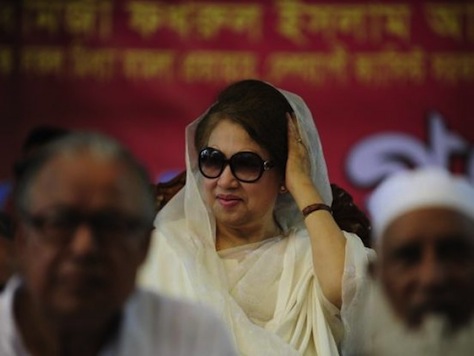Former prime minister Khaleda Zia, her son Tarique Rahman, and other top officials in the Bangladesh Nationalist Party (BNP, বাংলাদেশ জাতীয়তাবাদী দল) were indicted on charges of corruption yesterday, making it even more likely that Bangladesh will not soon end the political crisis that began with January’s elections — a vote boycotted by the BNP and other political parties not supporting Zia’s rival of three decades, Sheikh Hasina.![]()
While there’s plenty of evidence that just about every top figure in Bangladeshi politics is likely guilty of some form of corruption, the timing of the charges is suspicious. There’s nothing inconsistent with the notion that Zia (pictured above) and her allies are culpable for graft and that Hasina’s governing Bangladesh Awami League (বাংলাদেশ আওয়ামী লীগ) is using the countries judicial system to pressure Zia and the BNP. Zia’s supporters are already calling the charges a government conspiracy against her. True or not, the decision will only further divide Zia and Hasina, making it less likely that the two leaders can negotiate a truce, however warily, to end Bangladesh’s political and governance crisis.
Specifically, Zia is charged with misappropriating around $430,000 from a charity in honor of Zia’s late husband, Ziaur Rahman, a commander in the country’s 1971 war of independence, and president of Bangladesh from 1977 until his assassination in 1981. The charges against Zia date form her last stint as prime minister between 2001 and 2006, and the charges were initially filed in 2008 by the Bangladeshi anti-corruption commission.
* * * * *
RELATED: Opposition continues boycott of Bangladesh’s parliamentary elections
* * * * *
The trial is set to begin on April 21 — and that’s likely to exacerbate political tensions in the country that haven’t subsided since the January 5 election. Hasina’s Awami League, essentially running unopposed, won 232 of the 300 seats in Bangladesh’s country’s Jatiyo Sangshad (national parliament). The charges carry a potential sentence of life imprisonment, and the disorder at Wednesday’s hearing, where Zia and other BNP officials were charged, is a harbinger of what will certainly be wide protests over the next month and beyond.
Bangladesh’s opposition parties boycotted the election after Hasina refused to appoint a caretaker government to oversee the elections — though such a caretaker arrangement isn’t a legal requirement, it’s been accepted practice since a similar boycott and crisis in 1996 (back then, it was Zia in power and Hasina protesting).
Political violence isn’t uncommon in Bangladesh, and the protests in the days leading up to the last election resulted in up to 200 deaths. But the January election also took place against the backdrop of broader divisions within the country that go back to the way that country won independence from Pakistan in 1971 — the 2013 protests in Shabagh Square in downtown Dhaka were some of the largest post-independence protests in Bangladesh. Protesters demanded the execution (not merely a life sentence) of Islamist leader Abdul Quader Mollah, a request that Hasina’s government met in December 2013. The government also took steps to restrict Jamaat-e-Islami (বাংলাদেশ জামায়াতে ইসলামী), Bangladesh’s largest Islamist political party (though it’s not historically attracted mass support). Those decisions also angered Zia’s supporters in the BNP, which draws more support from Bangladesh’s Muslims than Hasina’s Awami League.
Notwithstanding decades of political instability, and notwithstanding the more recent surges of intense fighting over Mollah’s execution, Shabagh protests and the largely ignored war crimes of 1971 and the controversy surrounding January’s parliamentary elections, Bangladesh’s leaders seem headed on a course for yet another showdown, making it much less likely that Zia and Hasina will negotiate some sort of deal for Bangladesh to hold more robust elections later this year.

Very well written, Kevin, though I would argue that the BNP only nominally “draws more support from Bangladesh’s Muslims than Hasina’s Awami League.” Bangladesh has a majority Muslim population from which both the two major parties draw support. What the BNP has done in the past year is encouraged and allowed its political ally, the Jamaat e-Islami (alongside splinter groups like Hefazat e-Islam) to frame the terms of the discussion, such that supporting the war crimes tribunal in early 2013 (and the Shahbagh Movement) suddenly became synonymous with supporting the Awami League and also with supporting “atheists” (নাস্তিক) who were “against Islam,” and so forth.